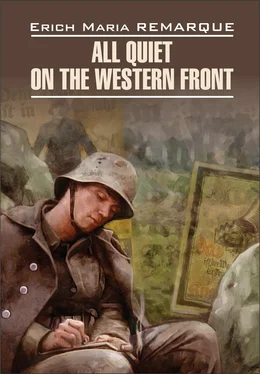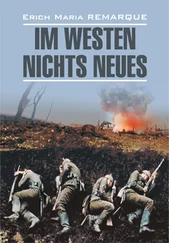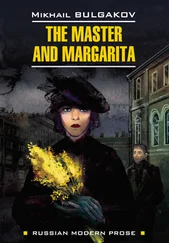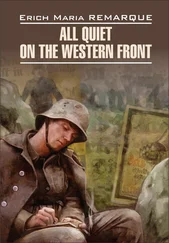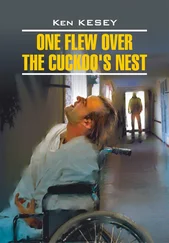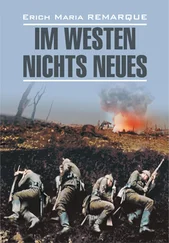Oh Mother, I know what these two pairs of underpants have cost you in queueing and running around and begging! Oh Mother, Mother, it is quite incomprehensible that I have to leave you! Who has more right to have me here than you? I’m still sitting here and you are still lying there, and there are so many things we should say to each other, but we shall never be able to. ‘Goodnight, Mother.’
‘Goodnight, Son.’
The room is dark. My mother’s breathing is uneven. Meanwhile the clock ticks. There is a breeze outside the windows. The chestnut trees are rustling.
In the vestibule I stumble over my pack, which they have got ready for me, because I have to leave very early in the morning.
I bury my head in my pillow, I clench my fists round the iron uprights on my bedstead. I should never have come home. Out there I was indifferent, and a lot of the time I was completely without hope – I can never be like that again. I was a soldier, and now it is all suffering, for myself, for my mother, for everything, because it is all so hopeless and never-ending.
I should never have come home on leave.
I know the barracks at the training camp out on the moors. This was where Himmelstoss decided to educate Tjaden. But I recognize hardly any of the people; as usual, there have been lots of changes. I remember seeing one or two when I was here before, but only in passing.
I carry out my duties mechanically. I spend most evenings at the Soldiers’ Club. There are newspapers there, but I don’t read them. There is a piano, though, and I like to play it. Two girls serve us, one of them quite young.
The camp is surrounded by a high barbed-wire fence. If you get back late from the Soldiers’ Club you’re supposed to have a pass. Mind you, if you get on to decent terms with the sentries you can slip through anyway.
Every day we practise company manoeuvres on the moors, amongst the juniper bushes and the silver birches. It’s all perfectly bearable, as long as you are not too demanding. You run forwards and throw yourself down, with your breath blowing the flowers and stalks of the heathland plants this way and that. Seen from that close to the ground, the sand is as pure as if it were in a laboratory, made up out of many tiny little grains. You get a strange urge to dig your fingers into it.
But best of all are the woodlands, with the birch trees at the edges. They are constantly changing colour. The trunks may be shining and dazzlingly white, with the pastel green of their leaves waving between them, silky and airy; and then in the next moment it all changes to an opalescent blue, with silver coming in from the edges and dabbing the green away; but then all at once it can deepen almost to black at one point, when a cloud crosses the sun. And this shadow flits along like a phantom between the trunks, and suddenly they are pale again, as it passes further across the moors to the horizon – and now the birch trees are like ceremonial banners, their white trunks standing out against the red-gold flame of their changing leaves.
I often become completely absorbed in this interplay of the most gentle lights and translucent shadow, so much so that I nearly miss some of the commands – when you are on your own you start to look at nature, and to love it. And I haven’t many contacts here, nor do I want any, beyond normal day-to-day living. You don’t get to know other people well enough for anything more than a chat and a game of cards in the evenings.
Next to our barracks is the big POW camp [214] POW camp = prisoner-of-war camp – лагерь для пленных
for Russian soldiers. It is separated from us by wire fencing, it is true, but the prisoners still manage to get over to us. They behave in a very shy and nervous manner, even though they are mostly big and bearded; because of this, they seem to us like meek and mistreated St Bernard dogs [215] St Bernard dog – собака породы сенбернар
.
They creep around our barracks and raid the rubbish bins. Heaven knows what they find there. Our own rations are short and, more to the point, not very good, with things like turnips cut into six pieces and boiled, or carrot-tops that are still dirty. Brown-flecked potatoes are a great luxury, and the best we get is a watery rice soup which is supposed to have strips of beef in it. But they are cut so thinly that you can’t even find them.
In spite of this it all gets eaten, of course. On those occasions where someone is really so well off that he doesn’t need to wolf down everything he’s got, there are other men right beside him who are happy to take it off him. Only the absolute dregs that can’t be reached with a spoon are washed out and dumped into the garbage vats. Sometimes they are accompanied by a few turnip peelings, mouldy crusts of bread and all sorts of other refuse.
This cloudy murky water is what the POWs are after. They scoop it greedily out of the stinking vats and carry it away in tins under their tunics.
It is odd seeing these men – our enemies – at such close quarters. Their faces make you stop and think, good peasant faces, broad foreheads, broad noses, broad lips, broad hands, shaggy hair. They really ought to be ploughing or harvesting or apple-picking. They look even more good-natured than our own farmers from over in Frisia [216] Frisia – Фризия (сельский район в Германии)
.
It is sad to watch their movements, to see them begging for food. They are all pretty weak, because they get just enough to keep them from starving. We have nowhere near enough to fill our own bellies – they have dysentery, and many of them show us their blood-stained shirt-tails [217] blood-stained shirt-tail – окровавленный подол рубахи
, covertly and with nervous glances. Their backs and their heads are bowed, their knees bent, they look up at you with their heads on one side when they stick their hands out and beg, beg in those gentle, soft bass voices redolent of warm stoves in comfortable rooms back in their homeland.
Some of the men kick them so that they fall over – but only a few do that. Most don’t hurt them, they just walk past them. Occasionally, when they are especially persistent, it is true, you do lose your temper and give them a kick. If only they wouldn’t look at you the way they do – how much misery there can be in two little spots that you could cover with your thumbs, their eyes.
In the evenings they come across to the barracks to trade things. They will exchange anything they have for bread. Sometimes they are successful, because they have good boots, whereas ours are poor. The leather of their high boots is wonderfully soft, like suede. The farmers’ sons among us, who get butter and so on sent to them from home, can afford them. The price of a pair of boots is between two and three loaves of army-issue bread, or one loaf and a small salami.
But nearly all of the Russians have already handed over the things they had long ago. Now they only have shoddy stuff to wear and they try to barter little ornaments and carvings that they have made from bits of shrapnel or from the copper driving bands of shells. These things don’t bring much in, of course, even though they have taken a great amount of effort to make – they’ll go for nothing more than a couple of slices of bread. Our country people are hard and crafty when they are bargaining. They hold the piece of bread or the sausage right under the Russian’s nose until he goes pale with greed, he rolls his eyes, and he’ll agree to anything. Our men pack up their booty with all the ceremony they can muster, then slowly and carefully they cut themselves a hunk of bread from their own supplies, take a piece of the good, hard sausage with every mouthful, and get stuck into it, as a reward to themselves. It is annoying watching them having their evening meal, what you’d really like to do is clout their thick heads. They seldom share anything. To be fair, people just don’t get to know each other well enough.
Читать дальше
Конец ознакомительного отрывка
Купить книгу
